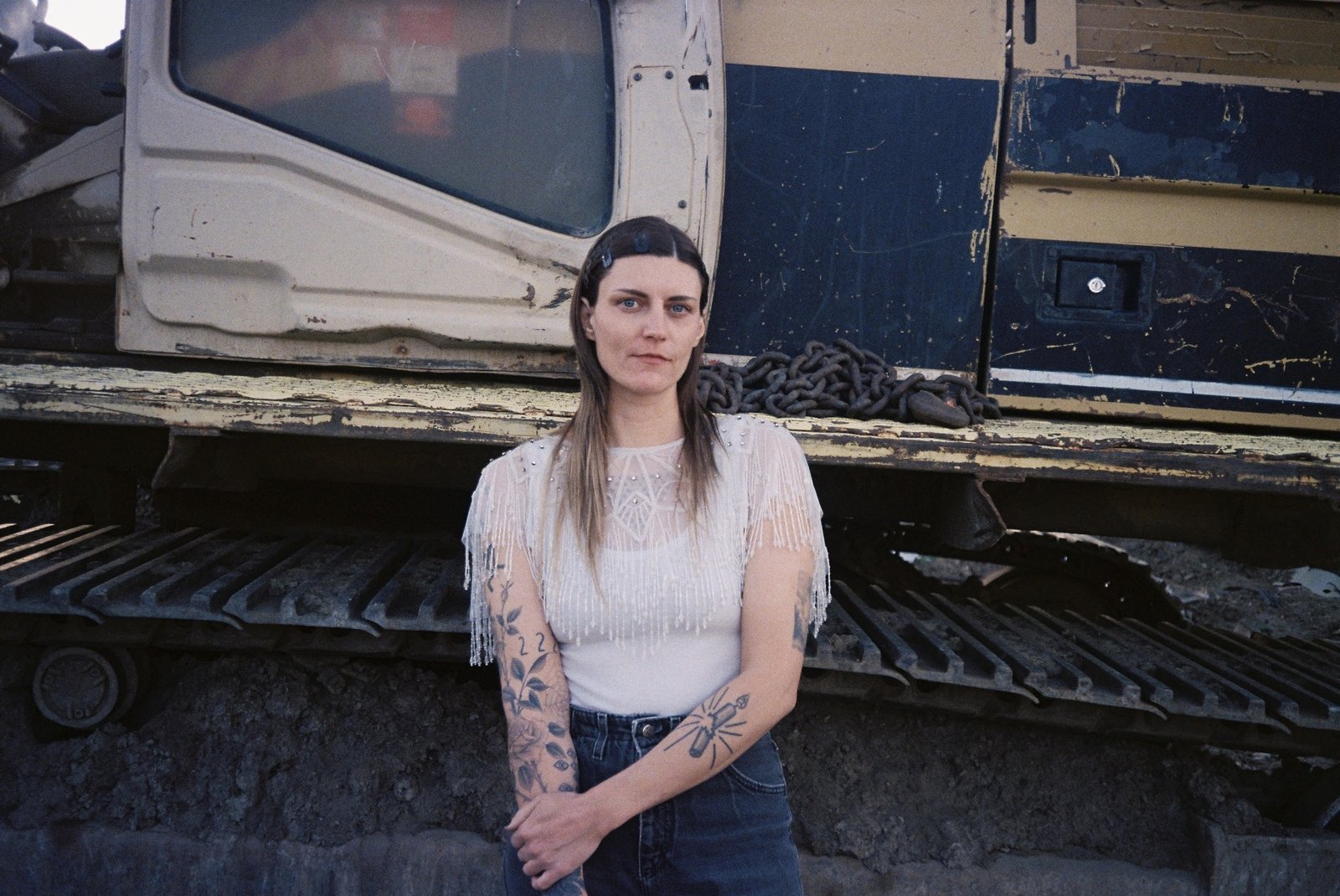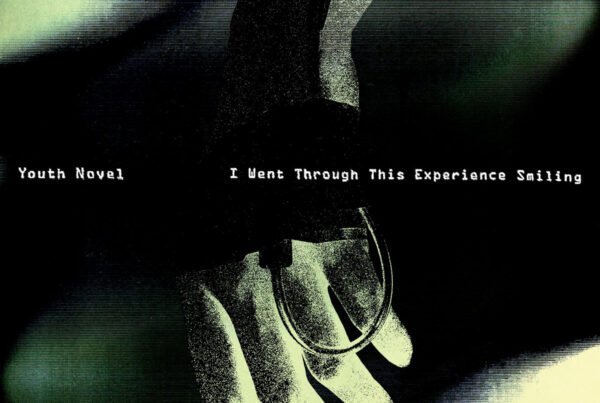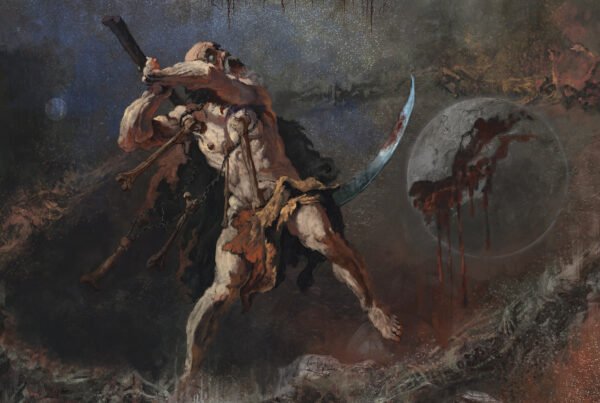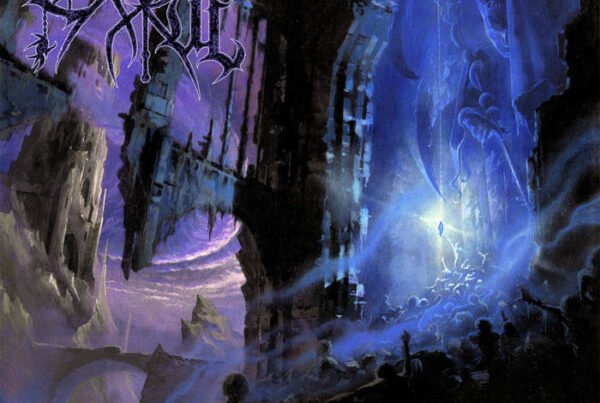Midwife‘s ‘heaven metal’ languidly slides into a quiet, powerful abyss on the slow-core No Depression In Heaven.
Release date: September 6, 2024 | The Flenser | Instagram | Facebook | Bandcamp
The first plaintive chords of Midwife‘s “Killdozer” sound disturbingly like the cringe-worthy “Closing Time” from Semisonic. 1998 was a musical nadir- a time when all the juice from the ‘good’ bands had been squeezed out, and the only thing left were the rotten fruits at the bottom of the proverbial barrel, a mix of Collective Souls, Everclears and Eve 6s, among other flashes in the sizzling oil of the late ’90s pan. And yet those chords linger in a wash of echo and reverb, and then reconfigure into a plaintive Liz Phair semi-sonic painting before Madeline Johnston whispers into the microphone ‘All my songs are love songs/All my songs are blue/All my songs are about death’, an apt metaphor for the journey the artist takes the listener on her fifth album in nearly four years No Depression In Heaven.
These references keep slipping further into the past until one reaches perhaps the artist that is closest to existing in the same sad, morose and beautiful universe, the bombastic, industrial noise of ’80s greats Killdozer. Whether any of this is deliberate is up for interpretation and- most likely- way, way off base; however, it does touch on what makes the music of Midwife so damned compelling, despite its stripped down innocence. In a matter of minutes, armed with just an electric guitar, microphone and a copious amount of pedals, Johnston manages to navigate the cultural waters of four decades without really saying anything culturally at all. And that’s a good thing.
Midwife exists in a realm that Johnston refers to as ‘heaven metal,’ a world where heavy goes way beyond Marshall half-stacks, Flying Vs, long hair and RAT pedals. Like contemporaries Lingua Ignota, Emma Ruth Rundle, and Chelsea Wolfe, she takes heavy metal and squeezes it into the rusty cogs and gears of a machine that’s been traditionally operated by a bunch of angry men. It’s metal filtered through the daily struggles of womanhood, a view of the world that is, in some ways, truly feminine, if not outright feminist. It’s deeply personal, deeply emotional, and deeply self-deprecating music; in other words, it’s fucking heavy. This alone makes Blood Incantation picking her as their opening act on their 2025 tour an extremely reasonable choice. Standing on stage in dim light, smoke gathering around her legs as she’s wrapped up with her minimalist display of noise-making weapons, Midwife is projected as a beacon of heaviness, the town-crier for a village in which no one has been left alive. Be it through death by fire, plague, rape or pillage, Johnston’s music is a lamentation for the end of life no matter how one views it.
And yet there is a fierce streak of irony that’s always punctuated Midwife‘s sad slow-core. On the glacially paced opener “Rock N Roll Never Forgets”, Johnston sings of the power of music over chords that barely move an inch, so overcome by their own heavy inertia.
‘Rock N Roll will never die
Rock N Roll run for your life
Rock N Roll sees everything
Rock N Roll watch over me
Rock N Roll never forgets’
Calling Midwife‘s music ‘rock and roll’ is a stretch by any imagination and yet at its core, that’s exactly what it is. It’s music that never dies, that makes you run for your life, that sees everything. It’s music that lingers long after those who recorded it are gone. It’s music that exists beyond what’s happening at the moment. Like her single from 2020 “Anyone Can Play Guitar”- as well as “Killdozer”- Midwife juxtaposes their compositions against the cultural zeitgeist and in turn asks the timeless question as to what the fuck rock and roll actually is. And in Johnston’s hands, her simple, effect-drenched guitars and bottom of the well whispers give the listener time to think and engage with this question.
This question, coupled with an intense focus on communicating the pain of loss and grief, propel Midwife‘s music forward. Even with the beats-per-minute slowly settling around what might seem to be single digits, the album continues to move forward. Perhaps this is the essence of loss and grief, really: that even under the impossible weight of emotional pain, life still trudges onward. The role Johnston plays as an artist is to help the listener navigate this journey of unimaginable heartache. She does this in stripped down, minimalist fashion, ripping the facade off of the stoicism that seems to be held in such high value in the Western world. “Vanessa” deals with this all too common theme- of being in love and finding that love slowly moving away.
‘I know that you tried
When I think of you I think about nothing
The words are just out of reach
Every time you drive away, you’re leaving
When you drive away, you’re leaving me’
While songs like the aforementioned “Vanessa” deal with pain and loss head on, it’s when Midwife gets more obtuse and creatively playful that things get really interesting. The title track “No Depression In Heaven” shares its name with a famous Carter Family song from the 1930s, one that literally suggests the only escape from the very real economic Depression happening in pre-World War II is to die and go to heaven. In addition, Johnston’s repeated plea of ‘cryin‘ on the song seems like a tragic reworking of the Roy Orbison classic. The melody, stretched and languid and buried under her distinctively reverb-drenched vocals, is still very much lifted from Orbison’s song of loss. Midwife has always seemed to reshape our understanding of popular music, the entire album a skeletal version of the many headed beast that defines popular culture today.
No Depression In Heaven is no major shift in Johnston’s prolific production. In some ways, she may have even pulled back a little on this latest album. If it was stripped down any more, it would be barely a whisper of audio, another mote of dust caught in the light shining through the translucent sheen of a centuries old window. Instead, Midwife slowly peels back another painful layer from the skin of human existence: each stroke of the guitar and each breath expelled another brief moment of escape from the pain and grief that are as much a part of our human existence as that breath itself. Madeline Johnston is here to let us know that it’s okay to revel in our grief and pain- that to deny that is to deny our very existence. After all, with each breath and stroke of that guitar, Midwife brings us one step closer to understanding the things that shape us into who we are and define where we are going, heaven or not.






